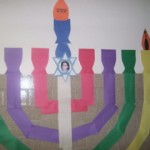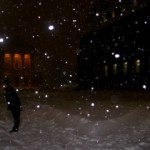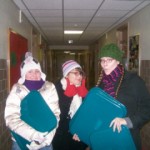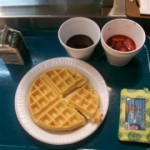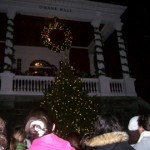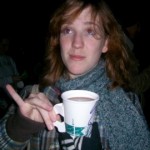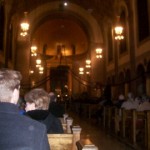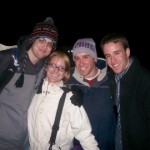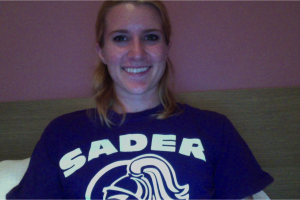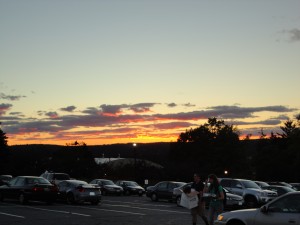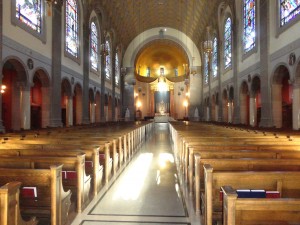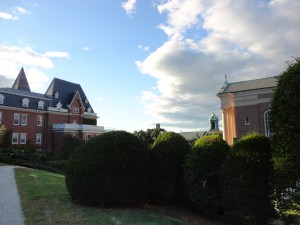On Saturday, most of my friends were back at Holy Cross for Homecoming. And, man, did I want to be there. But, I celebrated Homecoming in my own special way. Saturday was my one day off in Rome, so I was able to just walk around the city. On Saturday, I found myself in the Church of St. Ignatius, and while I was there, I just reflected on the appropriateness of the situation. Without my experience at Holy Cross, I probably wouldn’t have found myself studying at the Biblioteca Apostolica Vaticana. In fact, during my stay at the BAV, I was able to consult the manuscript that started it all – the Libri Carolini, which you’ve heard of if you’ve read this blog since my sophomore year. Prof. Ellen Perry suggested that I research it for my research paper for her honors seminar, and that’s where everything just happened – I was fascinated by this book; the amount of detail that went in to making it a key grammatical treatise, the construction of it, the wide plans for its dissemination – everything just fascinated me. And on Monday, I actually held this eighth century book – the one that Theodulf of Orleans himself oversaw and Charlemagne could have very well touched – in my hands. That was really the most incredible experience of my time at the BAV. I was so fortunate that the BAV staff was so generous with letting me see such rare manuscripts during my stay there.
Okay, so enough reflecting (typical Holy Cross student over here – always reflecting). What was it really like? Well, when I finally got my library card and everything sorted (which was such a process anyway), the actual research was incredible. Here’s a breakdown:

7:30 a.m.: I woke up to the sounds of cars buzzing outside my hotel (http://www.lacupolabedandbreakfast.com/, which I would highly recommend to anyone), and started my day with a shower and breakfast of espresso and coffee cakes. I brought the latter, since I knew I wanted to spend my food money on nicer dinners instead – yay frugal graduate student living! The hotel provided the espresso, and I have to say it – as much as I love tea, I really learned to appreciate espressos on this trip. (Also, you can find espressos at bars (which are our cafes) for about 0,85 euros if you stand at the bar, like the Italians do.) After a brief review of the manuscripts I wanted to consult (the hotel had free wifi – win!), I headed off on my ten minute walk to the Vatican.

8:35: Arrive at the Vatican. I got to walk through the Sant Anna Gate, which is right before you hit the colonnade of St. Peter’s Basilica.

I walked through the first level of security – a Swiss Guard checking my ID – and then continued on the road, which was usually teeming with priests and nuns. Then I walked through the next level of security – a police officer checking my ID – as I entered the courtyard of the Belvedere Palace.

The entrance to the Belvedere Palace, complete with some nuns.

Inside the courtyard of the Belvedere Palace

The Biblioteca Apostolica Vaticana!
8:45: Opening time at the library. Upon entry, I handed over my card to the security guard, who checked me in. Then, I proceeded to the locker room, since bags are not allowed in the library. You have to hold your card to the reader, which unlocks a locker for you. After that, I entered through a a card reader entry, and then proceeded up three flights of stairs to the library. There are three rooms to the library – the actual library, the manuscript consultation room, and the manuscript library room. You have to have special access to the manuscript consultation room, which I did, and that’s where I spent all of my time. Upon entering the room, I had to hand over my card again to the librarians, who checked me into the reading room, and I had to sign in as well and take my assigned seat for the day. If I had kept a manuscript on the shelves, I could pick it up, but due to my constricted time, I was working quickly through all of my manuscripts to see as many as possible. So, I then requested my manuscripts for the day, since all manuscripts have to be requested before noon.
10:00: Usually, this was the first delivery of manuscripts of the day. Some days (Friday and Monday), I had to wait a bit longer, since I was working with special codices, but usually I had at least one manuscript available within the first delivery. Although you can call up three manuscripts in the morning, you can only have one at your desk, so the other two needed to stay at the librarians’ desk. I would take back my manuscript to my desk, and begin to work with it.
1:00: Lunch time! Unlike some other libraries in Italy, the BAV doesn’t close for a two hour lunch, which is awesome. You could potentially just work through the day. But, I like food. You have to be checked in and out of the library every time you want to leave (even if it’s to go to the bathroom), so I would hop up and explain that I was coming back and to hold my manuscripts, please. Then I would dash back to the hotel, which was equipped with a mini-fridge. That was awesome, since I ended up saving so much money on lunches. On the first day that I was in Rome, I just headed over to a market to pick up some crostini, cheese, and fruit for the week. However, did you know that you’re supposed to weigh your fruit and then print out a barcode for it? Yeah, I didn’t know that. I like the system since it’s so efficient, but it really only works if you know about it. Anyway, quick lunch with some espresso, and head back to the Vatican.
2:00: Back at work.
5:00: The BAV shuts down at 5:15, so I usually started to return my manuscripts, check out of the manuscript room, pack up my locker, and check out of the library by 5:00. After a brief stop at Fatamorgana Gelateria (seriously, I have never had better gelato. The pistachio and passion fruit were amazing), I headed back to the hotel to drop off my work stuff and change into some cooler clothes for the night. See, Italian Cathedral Libraries have modesty rules, which is absolutely fine. But when it’s really hot out (like it was this past week in Rome), the last thing you want to do is continue wearing your skinny jeans and button down shirt. After that, I’d head out for some walks around Rome.

8:00: The Italians eat very late. Even by showing up at 8:00, I was still early. But hey – when you’ve only had some coffee cakes, toast, cheese, and fruit all day (oh. And some gelato…), you get hungry, and you can’t hold out until the more acceptable 8:30 dining hour. Italian dinners also take a while – usually they clock in a 2 hours. Can you tell why I love Italy?! I stayed on the Prati side of the Tiber for my dinners, since I kind of didn’t want to be wandering around Rome by myself at night. And I’m glad I did, since the Prati area tends to be more local and less touristy than other sections of Rome (when you get away from the immediate Vatican area, that is). I didn’t have a bad meal in the Prati area at all. Of course, the locals were a bit shocked when I asked for a table for one, but they got used to it and my journaling or reading habits at dinner.
10:30-11:00: Walk home to the hotel, and stop to see some sights along the way.


And then, repeat!
Working in the Vatican was a dream. I was granted access to so many reserved manuscripts. It was really such a surreal experience. Hopefully I’ll be able to continue my research there, since I had to rush through a bit of my manuscript consultation.

